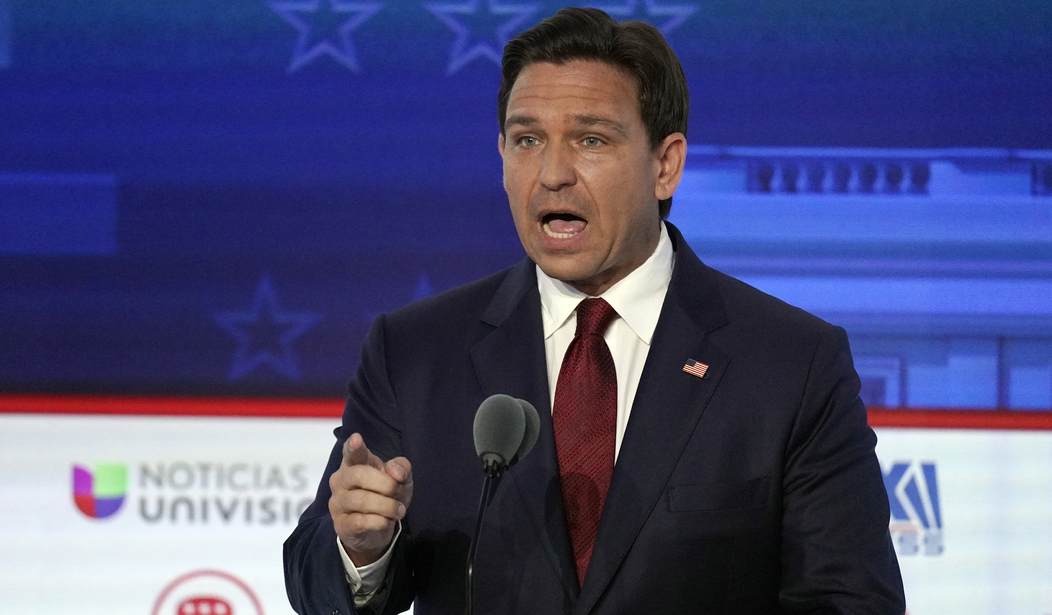Florida Gov. Ron DeSantis has his pro-gun credentials mostly good to go. No, Florida’s permitless carry law isn’t as good as it could be–Florida has a problem with open carry for some reason–but it’s still better than they had.
And those credentials are, ultimately, a good thing since he’s running for president.
In the wake of Lewiston, though, anyone who is pro-gun is being asked to answer for what happened. For many of us, that happens on social media. For someone like DeSantis, though, that happens on Meet The Press.
It was there the governor offered his questions about just how Lewiston happened in the first place.
Asked to respond to newly elected Speaker Mike Johnson’s (R-La.) argument that “the problem is the human heart — it’s not guns,” DeSantis said, “Well, first of all, I think this was a very tragic thing. And, you know, my heart goes out to all the victims, and it’s truly horrific. I think, in this case, there was a medical intervention, [a] health intervention. He clearly had problems. He was involuntarily committed.”
“He would not have been somebody that would have … been a prohibited possessor based on that adjudication,” DeSantis continued. “So, this is, I think an, an example where clearly this is a guy, very well trained, had a lot of skills, and then went off his rocker. There was an intervention, but it wasn’t enough.”
The suspected gunman, Robert Card, 40, was a U.S. Army reservist who enlisted in December 2002, an Army spokesperson confirmed to The Hill. Maine police confirmed Card had an ongoing struggle with mental health, which was likely connected to Wednesday’s mass shooting in Lewiston, Maine.
DeSantis said he would like to know “why there wasn’t more done” and claimed there has been a “major push” over the last 40 to 50 years for the “deinstitutionalization of people.” The Florida Republican said he would be “more aggressive” for those demonstrating a danger to society.
Unsurprisingly, moderator Kristen Welker tried to push back on that, but DeSantis is still asking some valid questions.
After all, the killer threatened to shoot up a National Guard armory, among other things. It was clear he was a disturbed individual.
Once upon a time, the United States was a lot more likely to lock someone away who was suffering from mental health issues. Then in the 1960s, we started pulling back from that. People who weren’t a danger to others were allowed to be at home, to try and live their lives as best they could. Even many who could be a danger if they stopped treatment were allowed to do so as well.
In recent years, there have been questions about whether that’s part of why we’re having such an issue with violent crime.
After all, we often find that mass shooters, for example, have some degree of mental illness are are often taking meds for those conditions. Many blame the meds themselves for the uptick and while I don’t necessarily agree, I also can’t definitively disprove the role medications might play.
Regardless, there’s something going on and if mentally ill people were institutionalized more, we might see less of these kinds of things.
Or we might not.
After all, how many times do we see laws meant to disarm certain people simply not used? The laws regarding domestic violence weren’t used to prevent Parkland, for example. Lewiston should never have happened, either, based on the killer’s past actions and the laws that are already in place.
As such, I’m left wondering how many people would even consider institutionalizing a loved one.
People don’t think those they care about are capable of such horrific things in many cases, so I’m left wondering if that would actually do anything.
For the record, it looks like DeSantis is just asking questions and not specifically saying we should go back to 1960 in how we deal with mental health, and it’s a fair question. I just don’t think doing anything like that would be the answer some think it to be.








Join the conversation as a VIP Member